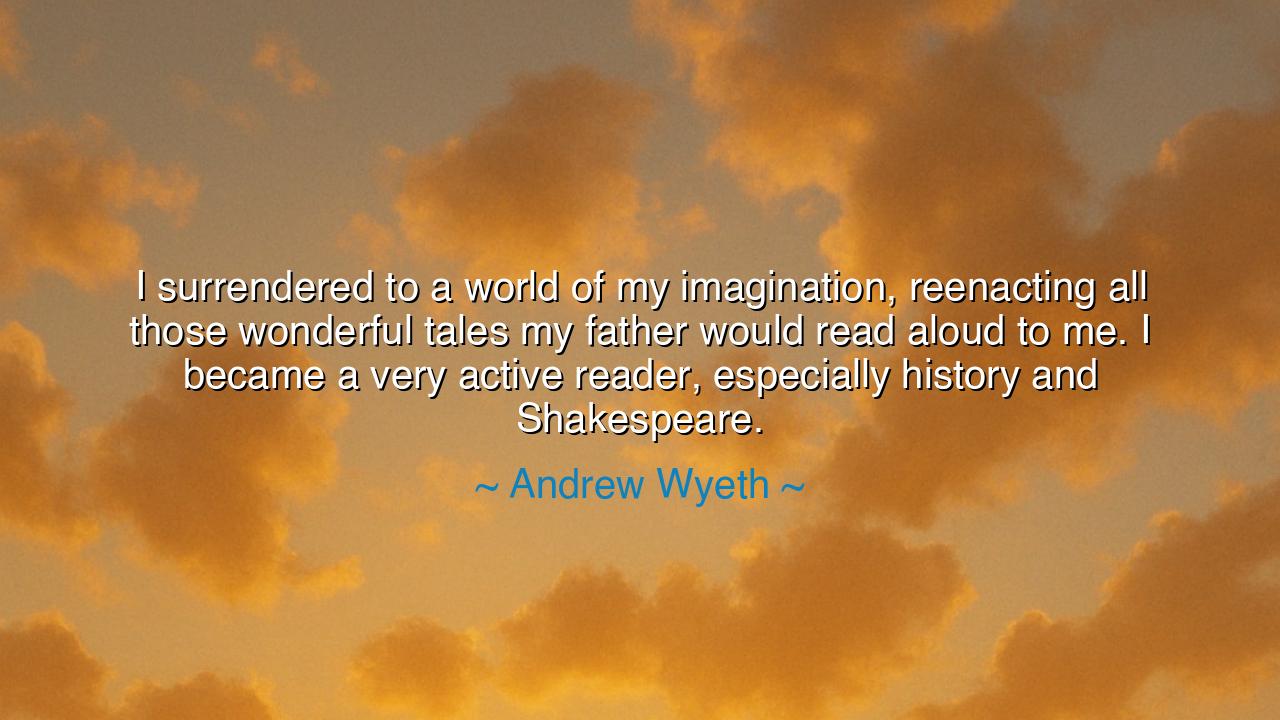
I surrendered to a world of my imagination, reenacting all those
I surrendered to a world of my imagination, reenacting all those wonderful tales my father would read aloud to me. I became a very active reader, especially history and Shakespeare.






In the voice of quiet reverence and artistic remembrance, Andrew Wyeth, the painter of solitude and soul, once said: “I surrendered to a world of my imagination, reenacting all those wonderful tales my father would read aloud to me. I became a very active reader, especially history and Shakespeare.” These words are not the mere recollections of a man of art — they are the testament of one who understood that imagination is both inheritance and awakening. Wyeth, whose canvases captured the stillness of rural life with haunting intimacy, reveals here the secret source of his genius: a childhood fed by stories, by the music of words, and by the eternal power of the imaginative mind.
When he says, “I surrendered to a world of my imagination,” Wyeth speaks of a sacred act — not of escape, but of devotion. To surrender in this sense is not weakness, but faith — faith in the unseen realms that dwell within every soul. It is the same surrender that poets, prophets, and dreamers of all ages have made, when they closed their eyes to the visible world and opened them to the invisible. The child’s imagination, when nurtured by stories and wonder, becomes the wellspring from which all creation flows. Wyeth’s father, the great illustrator N.C. Wyeth, read to him the tales of kings and wanderers, of valor and tragedy. These were not just stories; they were seeds planted in a fertile mind, later to bloom in the form of paintings that breathed both silence and story.
In the origin of this quote lies the story of inheritance — not of wealth or fame, but of spirit. Andrew Wyeth was raised not merely by his father’s hand, but by his father’s voice. In those moments when tales of Shakespeare’s kings and the chronicles of history filled the air, young Andrew learned that imagination is not idle fantasy — it is the shaping force of identity. When he reenacted those stories in play, he was not pretending — he was beginning to create, to translate the spoken word into vision, the remembered into the real. Thus, even before he held a brush, he was already painting — painting in the theater of the mind.
This surrender to imagination is not unique to Wyeth; it is the secret thread that connects all creators through time. Consider Leonardo da Vinci, who, as a boy, would watch the flow of rivers and the flight of birds, and in his mind saw machines that would one day take to the sky. Or William Shakespeare himself, who, from the whispers of history and the depths of human nature, fashioned worlds that continue to move us centuries later. Each of these visionaries began, as Wyeth did, by surrendering — by letting the imagination lead where logic could not. For imagination is the soul’s bridge to eternity; through it, the finite glimpses the infinite.
When Wyeth says he became “a very active reader, especially history and Shakespeare,” he reveals that imagination must be fed as much as it must be freed. To surrender to imagination without knowledge is to drift; to temper imagination with learning is to fly. History gave Wyeth the architecture of human struggle and triumph, while Shakespeare gave him the music of emotion and the truth of character. These two great teachers — the chronicle of the world and the poetry of the heart — became the twin pillars of his vision. From them, Wyeth learned that art is not invention alone, but remembrance — that to create is to listen to the voices of those who came before and to let their echoes find new form in your own hands.
Yet beneath this beauty lies a quiet challenge. For Wyeth’s surrender to imagination required solitude — a willingness to turn inward when the world clamored outward. His art, often misunderstood for its simplicity, was born not of noise, but of stillness. In this stillness, he listened — to the voices of the past, to the whispers of memory, to the silence between words. And so, his imagination did not lead him away from reality, but deeper into it. The landscapes and figures he painted — the fields, the weathered houses, the lone figures gazing into distance — were not inventions but revelations. They were the meeting of imagination and truth.
So, O seeker of meaning, take this lesson from Andrew Wyeth’s wisdom: surrender to your imagination, but do so with reverence and intention. Feed it with stories, with history, with beauty and truth. Let it carry you beyond the narrow confines of what is known, but keep your feet rooted in what is real. Remember that imagination is not a flight from life — it is the deepest engagement with it. The painter, the poet, the dreamer, the builder — all are servants of the same divine fire.
Thus, when Wyeth surrendered to the world of his imagination, he was not turning away from reality; he was learning to see it anew. And in that vision lies the enduring truth of his quote: that the imagination, when guided by wisdom and nourished by story, becomes the bridge between the seen and the unseen. Let your imagination be such a bridge. Walk it bravely. For in the world of imagination — that sacred landscape within — every human being may find not only creation, but revelation, and through it, the truest expression of the soul.






AAdministratorAdministrator
Welcome, honored guests. Please leave a comment, we will respond soon